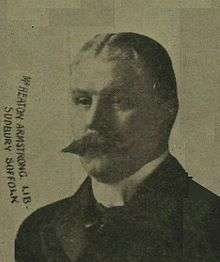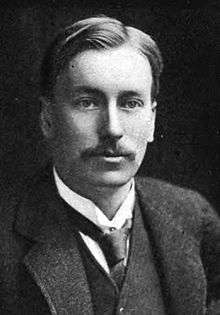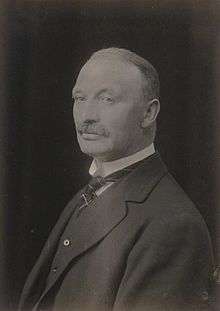Sudbury (UK Parliament constituency)
| Sudbury | |
|---|---|
|
Former Borough constituency for the House of Commons | |
| 1559–1844 | |
| Number of members | two |
| Sudbury | |
|---|---|
|
Former County constituency for the House of Commons | |
| 1885–1950 | |
| Number of members | one |
| Replaced by | Sudbury and Woodbridge |
| Created from | Western Division of Suffolk |
Sudbury was a parliamentary constituency which was represented in the British House of Commons. A parliamentary borough consisting of the town of Sudbury in Suffolk, it returned two Members of Parliament (MPs) from 1559 until it was disenfranchised for corruption in 1844. The Sudbury election of 1835, which Charles Dickens reported for the Morning Chronicle, is thought by many experts to be the inspiration for the famous Eatanswill election in his novel Pickwick Papers.[1]
A county constituency of the same name was established by the Redistribution of Seats Act 1885 for the 1885 general election, electing one MP by the first past the post voting system. It was abolished for the 1950 general election.
Boundaries
1885–1918: The part of the Municipal Borough of Sudbury in the county of Suffolk, the Sessional Divisions of Boxford, Cosford, Melford, and Risbridge, and parts of the Sessional Divisions of Newmarket, and Thingoe and Thedwestry.
1918–1950: The Municipal Borough of Sudbury, the Urban Districts of Glemsford, Hadleigh, and Haverhill, the Rural Districts of Clare, Cosford, and Melford, and parts of the Rural Districts of Moulton and Thingoe.
Members of Parliament
MPs 1559–1640
| Parliament | First member | Second member |
|---|---|---|
| 1559 | Clement Throckmorton | Henry Fortescue [2] |
| 1563 | John Heigham | Thomas Andrews [2] |
| 1571 | John Hunt | John Gurdon[2] |
| 1572 | Richard Eden | Martin Cole[2] |
| 1584 | Edward Waldegrave | Henry Blagge [2] |
| 1586 | Henry Blagge | Geoffrey Rusham [2] |
| 1588 | Thomas Eden | Thomas Jermin [2] |
| 1593 | William Fortescue | Dudley Fortescue [2] |
| 1597 | George Waldegrave | John Clapham [2] |
| 1601 | Philip Gawdy | Edward Glascock [2] |
| 1604-1611 | Sir Thomas Beckingham | Thomas Eden, jnr |
| 1614 | Robert Crane | Henry Binge |
| 1621 | Edward Osborne | Brampton Gurdon |
| 1624 | Robert Crane | Sir William Pooley |
| 1625 | Sir Nathaniel Barnardiston | Robert Crane |
| 1626 | Sir Nathaniel Barnardiston | Thomas Smith |
| 1628 | Sir Robert Crane | Sir William Pooley |
| 1629–1640 | No Parliaments summoned |
MPs 1640–1844
| Year | 1st Member | 1st Party | 2nd Member | 2nd Party | ||
|---|---|---|---|---|---|---|
| April 1640 | Sir Robert Crane | Parliamentarian | Richard Pepys | |||
| November 1640 | (Sir) Simonds d'Ewes [3] | Parliamentarian | ||||
| February 1643 | Crane died - seat left vacant | |||||
| 1645 | Brampton Gurdon | |||||
| December 1648 | D'Ewes ceased sitting after Pride's Purge | |||||
| 1653 | Sudbury was unrepresented in the Barebones Parliament | |||||
| 1654 | John Fothergill | Sudbury had only one seat in the First and Second Parliaments of the Protectorate | ||||
| 1656 | ||||||
| January 1659 | Samuel Hassel | |||||
| May 1659 | Not represented in the restored Rump | |||||
| April 1660 | John Gurdon | Joseph Brand | ||||
| 1661 | Thomas Waldegrave | Isaac Appleton | ||||
| 1662 | Sir Robert Cordell | |||||
| 1677 | Sir Gervase Elwes | |||||
| February 1679 | Gervase Elwes | |||||
| September 1679 | Sir Gervase Elwes | |||||
| 1685 | Sir John Cordell | Sir George Wenyeve | ||||
| 1689 | Sir John Poley | Philip Gurdon | ||||
| February 1690 | John Robinson | |||||
| October 1690 | Sir Thomas Barnardiston | |||||
| 1698 | Samuel Kekewich | |||||
| 1699 | John Gurdon | |||||
| 1700 | Sir Gervase Elwes | |||||
| January 1701 | Sir John Cordell | |||||
| December 1701 | Joseph Haskin Stiles | |||||
| 1703 | George Dashwood | |||||
| 1705 | Philip Skippon | |||||
| 1706 | Sir Hervey Elwes | |||||
| 1710 | John Mead | Lieutenant-General Robert Echlin | ||||
| 1713 | Sir Hervey Elwes | |||||
| 1715 | Thomas Western | |||||
| 1722 | John Knight | Colonel William Windham | ||||
| 1727 | Carteret Leathes | |||||
| January 1734 | Richard Jackson | |||||
| April 1734 | Richard Price | Edward Stephenson | ||||
| 1741 | Thomas Fonnereau | Carteret Leathes | ||||
| 1747 | Richard Rigby | |||||
| 1754 | Thomas Walpole | |||||
| 1761 | John Henniker | |||||
| 1768 | (Sir) Patrick Blake [4] | (Sir) Walden Hanmer [5] | ||||
| 1774 [6] | Thomas Fonnereau | Philip Champion Crespigny | ||||
| 1775 | Sir Patrick Blake, Bt | Sir Walden Hanmer | ||||
| 1780 | Philip Champion Crespigny [7] | |||||
| 1781 | Sir James Marriott | |||||
| 1784 | William Smith | John Langston | ||||
| 1790 | John Coxe Hippisley | Thomas Champion Crespigny | ||||
| 1796 | William Smith | Sir James Marriott | ||||
| 1802 | Sir John Coxe Hippisley | John Pytches | ||||
| 1807 | Emanuel Felix Agar | |||||
| 1812 | Charles Wyatt | |||||
| 1818 | William Heygate | John Broadhurst | ||||
| 1820 | Charles Augustus Tulk | |||||
| 1826 | John Wilks | Bethel Walrond | ||||
| 1828 | John Norman Macleod | |||||
| 1830 | Sir John Benn Walsh | Tory | ||||
| 1831 | Digby Cayley Wrangham | |||||
| 1832 | Conservative | Michael Angelo Taylor | Whig | |||
| 1834 | Sir Edward Barnes [8] | Conservative | ||||
| 1835 | John Bagshaw | Whig[9][10][11][12] | Benjamin Smith | Whig | ||
| July 1837 | Sir James John Hamilton | Conservative | Sir Edward Barnes | Conservative | ||
| December 1837 | Joseph Bailey | Conservative | ||||
| 1838 | Sir John Benn Walsh | Conservative | ||||
| 1840 | George Tomline | Conservative | ||||
| 1841 [13] | Frederick Villiers Meynell | Whig | David Ochterlony Dyce Sombre | Whig | ||
| 29 July 1844 | Constituency disfranchised for corruption and incorporated into Western Suffolk | |||||
MPs 1885–1950
Elections
Elections in the 1880s
| Party | Candidate | Votes | % | ± | |
|---|---|---|---|---|---|
| Liberal | Cuthbert Quilter | 4,913 | 58.7 | N/A | |
| Conservative | Thomas Weller Poley[15] | 3,461 | 41.3 | N/A | |
| Majority | 1,452 | 17.4 | N/A | ||
| Turnout | 8,374 | 79.6 | N/A | ||
| Registered electors | 10,522 | ||||
| Liberal win (new seat) | |||||
| Party | Candidate | Votes | % | ± | |
|---|---|---|---|---|---|
| Liberal Unionist | Cuthbert Quilter | Unopposed | |||
| Liberal Unionist gain from Liberal | |||||
Elections in the 1890s
| Party | Candidate | Votes | % | ± | |
|---|---|---|---|---|---|
| Liberal Unionist | Cuthbert Quilter | 5,111 | 63.8 | N/A | |
| Liberal | Arthur Graeme Ogilvie | 2,905 | 36.2 | N/A | |
| Majority | 2,206 | 27.6 | N/A | ||
| Turnout | 8,016 | 75.4 | N/A | ||
| Registered electors | 10,638 | ||||
| Liberal Unionist hold | Swing | N/A | |||
| Party | Candidate | Votes | % | ± | |
|---|---|---|---|---|---|
| Liberal Unionist | Cuthbert Quilter | Unopposed | |||
| Liberal Unionist hold | |||||
Elections in the 1900s
| Party | Candidate | Votes | % | ± | |
|---|---|---|---|---|---|
| Liberal Unionist | Cuthbert Quilter | Unopposed | |||
| Liberal Unionist hold | |||||

| Party | Candidate | Votes | % | ± | |
|---|---|---|---|---|---|
| Liberal | William Heaton-Armstrong | 4,201 | 50.8 | N/A | |
| Liberal Unionist | Cuthbert Quilter | 4,065 | 49.2 | N/A | |
| Majority | 136 | 1.6 | N/A | ||
| Turnout | 8,266 | 81.7 | N/A | ||
| Registered electors | 10,121 | ||||
| Liberal gain from Liberal Unionist | Swing | N/A | |||
Elections in the 1910s

| Party | Candidate | Votes | % | ± | |
|---|---|---|---|---|---|
| Conservative | Cuthbert Quilter | 5,026 | 55.9 | +6.7 | |
| Liberal | Francis Wrigley Hirst | 3,958 | 44.1 | −6.7 | |
| Majority | 1,068 | 11.8 | N/A | ||
| Turnout | 8,984 | 89.5 | +7.8 | ||
| Registered electors | 10,036 | ||||
| Conservative gain from Liberal | Swing | +6.7 | |||
| Party | Candidate | Votes | % | ± | |
|---|---|---|---|---|---|
| Conservative | Cuthbert Quilter | Unopposed | |||
| Conservative hold | |||||
General Election 1914/15:
Another General Election was required to take place before the end of 1915. The political parties had been making preparations for an election to take place and by the July 1914, the following candidates had been selected;
- Unionist: Cuthbert Quilter
- Liberal: Stephen Howard[16]

| Party | Candidate | Votes | % | ± | |
|---|---|---|---|---|---|
| Liberal | Stephen Howard | 6,656 | 52.1 | N/A | |
| C | Unionist | Richard George Proby | 5,746 | 44.9 | N/A |
| Labour | Joseph Rouse Hicks* | 390 | 3.0 | N/A | |
| Majority | 910 | 7.2 | N/A | ||
| Turnout | 12,792 | 48.4 | N/A | ||
| Liberal gain from Unionist | Swing | N/A | |||
| C indicates candidate endorsed by the coalition government. | |||||
- * some records describe Hicks as an 'Agriculture' candidate
Elections in the 1920s
| Party | Candidate | Votes | % | ± | |
|---|---|---|---|---|---|
| Unionist | Herbert Mercer | 7,298 | 47.0 | +2.1 | |
| National Liberal | Stephen Howard | 5,410 | 34.9 | n/a | |
| Liberal | Ernest William Tanner | 2,813 | 18.1 | n/a | |
| Majority | 1,888 | 12.1 | |||
| Turnout | 59.3 | +10.9 | |||
| Unionist gain from Liberal | Swing | ||||
| Party | Candidate | Votes | % | ± | |
|---|---|---|---|---|---|
| Liberal | John Frederick Loverseed | 8,813 | 52.0 | * -1.0 | |
| Unionist | Herbert Mercer | 8,148 | 48.0 | +1.0 | |
| Majority | 4.0 | 16.1 | |||
| Turnout | 63.8 | ||||
| Liberal gain from Unionist | Swing | -1.0 | |||
- compared to combined 1922 Liberal vote.
| Party | Candidate | Votes | % | ± | |
|---|---|---|---|---|---|
| Unionist | Henry Burton | 10,579 | 53.6 | +5.6 | |
| Liberal | John Frederick Loverseed | 9,168 | 46.4 | -5.6 | |
| Majority | 1,411 | 7.2 | 11.2 | ||
| Turnout | 73.3 | ||||
| Unionist gain from Liberal | Swing | +5.6 | |||
| Party | Candidate | Votes | % | ± | |
|---|---|---|---|---|---|
| Unionist | Henry Burton | 9,715 | 40.2 | -13.4 | |
| Liberal | Alan Sainsbury | 8,309 | 34.4 | -12.0 | |
| Labour | W. Jack Shingfield | 6,147 | 25.4 | n/a | |
| Majority | 1,406 | 5.8 | -1.4 | ||
| Turnout | 75.9 | +2.6 | |||
| Unionist hold | Swing | -0.7 | |||
Elections in the 1930s
| Party | Candidate | Votes | % | ± | |
|---|---|---|---|---|---|
| Conservative | Henry Burton | 13,500 | 55.3 | +15.1 | |
| Liberal | Alan Sainsbury | 10,929 | 44.7 | +10.3 | |
| Majority | 2,571 | 10.6 | +4.8 | ||
| Turnout | 76.7 | +0.8 | |||
| Conservative hold | Swing | +2.4 | |||
| Party | Candidate | Votes | % | ± | |
|---|---|---|---|---|---|
| Conservative | Henry Burton | 11,700 | 49.3 | -6.0 | |
| Liberal | Alan Sainsbury | 8,344 | 35.2 | -9.5 | |
| Labour | Horace Denton | 3,670 | 15.5 | n/a | |
| Majority | 3,356 | 14.1 | |||
| Turnout | 23,714 | 74.4 | |||
| Conservative hold | Swing | +1.7 | |||
Elections in the 1940s
General Election 1939/40:
Another General Election was required to take place before the end of 1940. The political parties had been making preparations for an election to take place from 1939 and by the end of this year, the following candidates had been selected;
- Conservative: Henry Burton
- Liberal: Frederic Sellers
- Labour: Roland Hamilton
| Party | Candidate | Votes | % | ± | |
|---|---|---|---|---|---|
| Labour | Roland Hamilton | 9,906 | 40.3 | ||
| Conservative | Henry Burton | 9,659 | 39.2 | ||
| Liberal | Margaret Hitchcock | 5,045 | 20.5 | ||
| Majority | 247 | 1.1 | |||
| Turnout | 69.5 | ||||
| Labour gain from Conservative | Swing | ||||
References
- ↑ M.C. Rintoul (1993). Dictionary of Real People and Places in Fiction. Taylor & Francis. p. 872. ISBN 9780415059992.
- 1 2 3 4 5 6 7 8 9 10 "History of Parliament". History of Parliament Trust. Retrieved 2011-10-20.
- ↑ Created a baronet, July 1641
- ↑ Created a baronet, September 1772
- ↑ Created a baronet, May 1774
- ↑ On petition, the result of the election of 1774 was overturned: Fonnereau and Crespigny were declared not to have been duly elected and their opponents, Blake and Hanmer, were seated in their place
- ↑ On petition, Crespigny was declared not to have been duly elected and his opponent, Marriott was seated in his place
- ↑ Elected on the casting vote of the returning officer after a tie in votes. His opponent petitioned against the decision, denying that the returning officer was entitled to a casting vote, but Parliament was dissolved before the issue had been settled.
- ↑ The Spectator, Volume 7. F. C. Westley. 1834. p. 702. Retrieved 13 May 2018.
- ↑ The Spectator, Volume 10. F. C. Westley. 1837. p. 651. Retrieved 13 May 2018.
- ↑ Sperling, Charles Frederick Denne (1896). A short history of the borough of Sudbury, in the county of Suffolk, compiled from materials collected by W.W. Hodson. Sudbury. pp. 162, 259. Retrieved 13 May 2018.
- ↑ "General Intelligence". Coventry Standard. 24 June 1853. p. 2. Retrieved 13 May 2018 – via British Newspaper Archive. (Subscription required (help)).
- ↑ The 1841 election was declared void on petition and a Royal Commission was appointed to investigate, which eventually led to the disfranchisement of the constituency
- 1 2 3 4 5 6 7 8 Craig, F. W. S., ed. (1974). British Parliamentary Election Results: 1885-1918. London: Macmillan Press. p. 394. ISBN 9781349022984.
- ↑ ‘WELLER-POLEY, Thomas’, Who Was Who, A & C Black, an imprint of Bloomsbury Publishing plc, 1920–2016; online edn, Oxford University Press, 2014 ; online edn, April 2014 accessed 22 Sept 2017
- ↑ Cambridge Independent Press 16 Jan 1914
- 1 2 3 4 5 6 7 8 British parliamentary election results, 1918-1949 (Craig)
- Robert Beatson, A Chronological Register of Both Houses of Parliament (London: Longman, Hurst, Res & Orme, 1807)
- D Brunton & D H Pennington, Members of the Long Parliament (London: George Allen & Unwin, 1954)
- Cobbett's Parliamentary history of England, from the Norman Conquest in 1066 to the year 1803 (London: Thomas Hansard, 1808)
- F W S Craig, British Parliamentary Election Results 1832-1885 (2nd edition, Aldershot: Parliamentary Research Services, 1989)
- Craig, F. W. S. (1983) [1969]. British parliamentary election results 1918-1949 (3rd ed.). Chichester: Parliamentary Research Services. ISBN 0-900178-06-X.
- Maija Jansson (ed.), Proceedings in Parliament, 1614 (House of Commons) (Philadelphia: American Philosophical Society, 1988)
- H G Nicholas, To The Hustings: Election scenes from English fiction (London, Cassell & Co., 1956)
- Leigh Rayment's Historical List of MPs – Constituencies beginning with "S" (part 6)